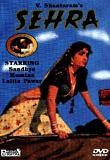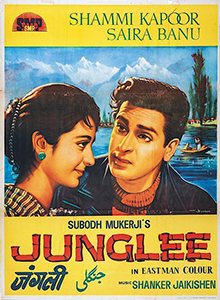
Junglee is a 1961 Indian comedy film produced and directed by Subodh Mukherjee. The music is composed by Shankar-Jaikishan and the lyrics by Shailendra and Hasrat Jaipuri. The film stars Shammi Kapoor, Saira Banu in lead roles, along with Shashikala, Anoop Kumar, Lalita Pawar in supporting roles. Saira Banu earned a Filmfare nomination as Best Actress.

Jhanak Jhanak Payal Baaje is a 1955 Indian Hindi-language dance film directed by V. Shantaram. It stars Shantaram's wife Sandhya and dancer Gopi Krishna in lead roles. One of the earlier Technicolor films made in India, the film won the All India Certificate of Merit for Best Feature Film, the National Film Award for Best Feature Film in Hindi, and the Filmfare Best Movie Award. The film was declared a "Super Hit" at Box office India.

Brahmachari (transl. Celibate) is a 1968 Indian film. Written by Sachin Bhowmick, it is a G. P. and Ramesh Sippy production directed by Bhappi Sonie. The film stars Shammi Kapoor, Rajshree, Pran, Mumtaz, Jagdeep, Sachin and Asit Sen. The music was by Shankar Jaikishan. The film became a box office Super Hit and won several awards, including Filmfare Best Movie Award.

Naya Zamana is a 1971 Indian Hindi-language film produced and directed by Pramod Chakrovorty. The film stars Dharmendra, Hema Malini, Ashok Kumar, Mehmood, Pran, Lalita Pawar and Aruna Irani. The music is by S. D. Burman. It was written by Aghajani Kashmeri, who also wrote Love in Tokyo and Ziddi for Pramod Chakravorty. The movie is loosely based on the 1944 Bengali movie Udayer Pathey and 1945 Hindi film Hamrahi, directed by Bimal Roy.

Geet Gaya Patharon Ne is a 1964 Hindi-language drama film, produced and directed by V. Shantaram on V. Shantaram Productions banner. Starring Jeetendra, Rajshree which were first marked debut to both of them and music is composed by Ramlal.
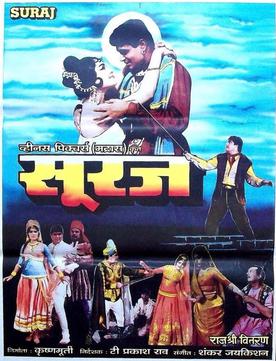
Suraj (transl. Sun) is a 1966 Hindi-language swashbuckler Ruritanian romance film produced by S. Krishnamurthy and T. Govindarajan and directed by T. Prakash Rao.

Prince is a 1969 Indian Hindi-language film produced by F. C. Mehra and directed by Lekh Tandon. The film stars Shammi Kapoor with Vyjayanthimala in the lead while Rajendranath, Ajit, Helen, Leela Chitnis and Asit Sen form an ensemble cast. The film's music was composed by Shankar Jaikishan with lyrics by Hasrat Jaipuri and Faruk Qaiser. Prince is a drama set in the times of resurgent India when the nation threw off the British yoke, but some states still languished under the Princely yoke. It is the story of a Prince who brought about his own downfall so that he may rise as a human being. Vyjayanthimala got married in 1968 and then completed this film in 1969.
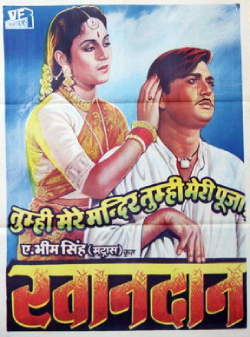
Khandan is a 1965 Indian Hindi language film directed by A. Bhimsingh. The film stars Sunil Dutt, Nutan, Pran, Om Prakash, Lalita Pawar, Helen and Mumtaz. The film's music is by Ravi. A box-office success, the film became the seventh highest earning film of 1965, earning an approximate gross of Rs. 2,80,00,000 and a net of Rs. 1,40,00,000. The film was a remake of director's own Tamil film Bhaaga Pirivinai.
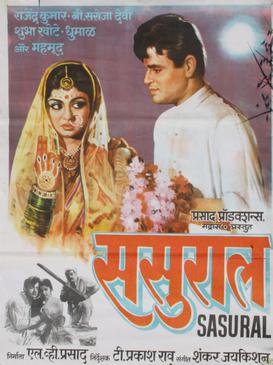
Sasural (transl. In-laws) is a 1961 Indian Hindi-language film produced by L. V. Prasad and directed by T. Prakash Rao. The film stars Rajendra Kumar, B. Saroja Devi, Mehmood and Lalita Pawar. The music is by Shankar–Jaikishan and songs were penned by Hasrat Jaipuri and Shailendra. It is a remake of the Telugu film Illarikam (1959). The film became a box office success.
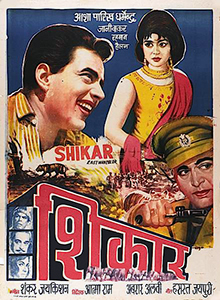
Shikar (transl. Prey) is a 1968 Hindi thriller film produced and directed by Atma Ram. The film is a murder mystery that became a box office hit and its songs were also big hits. It stars Dharmendra, Asha Parekh, Sanjeev Kumar, Helen, Rehman, Johnny Walker, Bela Bose, Ramesh Deo in pivotal roles. The music of the film was composed by Shankar-Jaikishan and its songs were penned by Hasrat Jaipuri. Asha Bhosle won the Filmfare award for best Female Playback singer, for the Arabic tuned song "Parde Mein Rehne Do, while Lata Mangeshkar and Asha Bhosle sang the duet song "Jabse Laagi Tose Najariya".
Bhai-Bhai (transl. Brothers) is a 1970 Bollywood suspense drama film directed by Raja Nawathe. It had music by Shankar Jaikishen with lyrics by Hasrat Jaipuri. The film stars Sunil Dutt, Asha Parekh, Mumtaz, Mehmood and Pran. It performed "above average" at the box office.

Amar Bhoopali is a 1951 Indian film, produced and directed by V. Shantaram and written by Vishram Bedekar. It is a true story about a simple cow herder who has an innate gift of poetry, set in the waning days of the Maratha confederacy, c. early 19th century. It is an ode to the saffron flag of Marathas, calling on people to rise again against the foreign enemy. It competed for the Grand Prize of the Festival at the 1952 Cannes Film Festival.

Diwana is a 1967 Indian Bollywood film directed by Mahesh Kaul. The film stars Raj Kapoor, Saira Banu and Lalita Pawar in pivotal roles. The film, made under the Anupam Chitra production banner had music by Shankar–Jaikishan, with lyrics by Hasrat Jaipuri and Shailendra. Some songs are still popular like "Diwana Mujhko Log Kahein ", "Jisne Tumhe Chand Si Surat", "Hum To Jate Apne Gaon" and "Tumhari Bhi Jai Jai". This film is also remembered for Kamal Kapoor's strong performance as Raj Kapoor's father.

Parchhain (Shadow) is a 1952 Hindi romantic melodrama film directed by V. Shantaram. The production company was Rajkamal Kalamandir. The story and dialogue were by Shams Lakhnavi, with cinematography by G. Balakrishna. Music direction was by C. Ramchandra and the lyricists was Noor Lakhnavi.

Dahej (Dowry) is a 1952 Hindi social family drama film based on the dowry system directed by V. Shantaram. Produced by Rajkamal Kalamandir, the director of photography was V. Avadhoot. Music was composed by Vasant Desai with lyrics by Shams Lucknavi, who also wrote the story and dialogues. The film starred Prithviraj Kapoor, Karan Dewan, Jayshree, Ulhas, Mumtaz Begum, Keshavrao Date and Lalita Pawar.

Hare Kanch Ki Chooriyan is a 1967 Hindi, social family drama film, produced and directed by Kishore Sahu. The story, screenplay and dialogue were written by Kishore Sahu. Shankar Jaikishan composed the music while the lyrics were written by Hasrat Jaipuri and Shailendra. Sahu presented his daughter Naina Sahu, in her debut acting role, as the main character. The film starred Biswajeet, Naina Sahu, Shiv Kumar, Nazir Hussain, Rajendranath, Helen and Lalita Pawar.
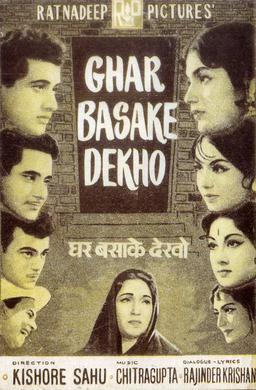
Ghar Basake Dekho is a 1963 Hindi family drama film, directed by Kishore Sahu. The film was produced by Trikambhai Dave and Bal Chander Shukla for Ratandeep Pictures, with music composed by Chitragupta and lyrics written by Rajendra Krishan. The story was taken from the Gujarati stage writer Prabhulal Dwivedi's story, 'Grahasti'. The screenplay and dialogues were by Rajendra Krishan.

Do Phool is a 1958 Indian Hindi-language family drama film directed by A. R. Kardar. Adapted from the 1881 children's novel Heidi by Johanna Spyri, it has Baby Naaz in the role of Poornima (Heidi). The film was produced by Akhtar Sultana Kadar, with dialogues written by Krishan Chander. The music director was Vasant Desai, and the lyrics were written by Hasrat Jaipuri. The film starred Romi, Baby Naaz, Vijaya Choudhary, Bipin Gupta, Ulhas, David, Agha, and Jeevan.

Satta Bazaar is a 1959 Indian Hindi-language film starring Meena Kumari and Balraj Sahni in lead roles. The music of the film was composed by Kalyanji Anandji.
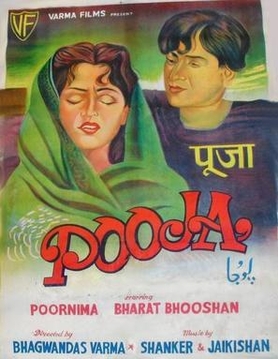
Pooja is a 1954 Bollywood film starring Bharat Bhushan and Purnima, produced and distributed by Varma Films. It was directed by Bhagwan Das Varma, one of the founders of Varma Films, who also wrote the screenplay for the film. It was the first film in which Purnima, who had previously worked in character roles for various movies for Varma Films, worked as the leading actress playing the role of a child widow.
